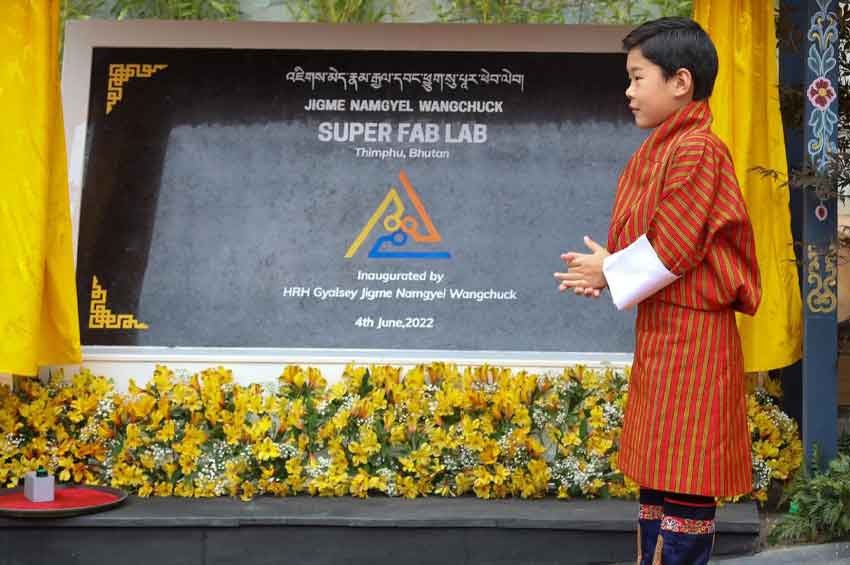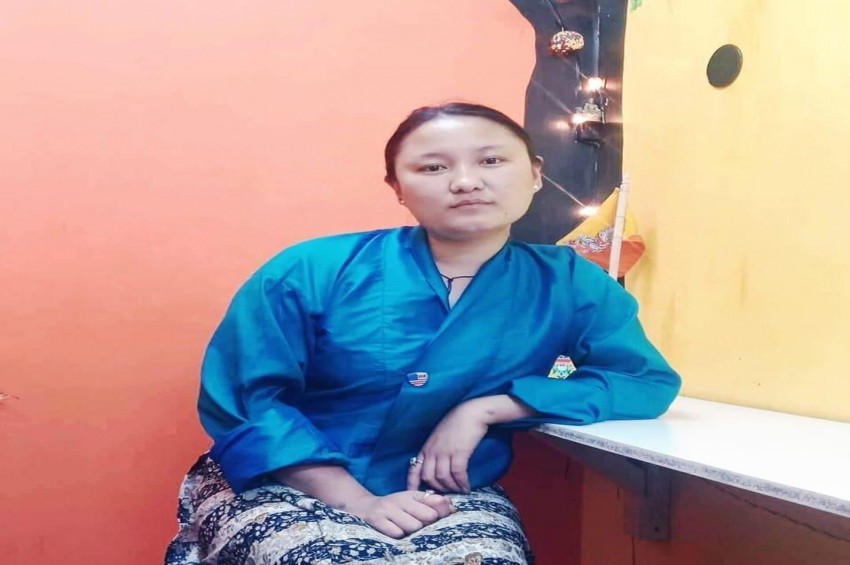In what is His Royal Highness (HRH), The Gyalsey’s first Royal Duty as Chief Guest, the Jigme Namgyel Wangchuck Super Fab Lab was inaugurated by HRH, coinciding with the Birth Anniversary of Her Majesty the Queen on June 4, 2022. A FabLab (short for Fabrication Laboratory), is a facility with computer-controlled tools and machines for anyone to build ‘almost anything’, a concept developed in Massachusetts Institute of Technology (MIT), USA. The FabLab, the second ever Super FabLab in the world outside the US, is equipped with high-end, state-of-the-art digital fabrication equipment. The FabLabs are visioned to engage people of all ages, build a vibrant learning environment, and provide tools and platforms to magnify the startup ecosystem in the country.
The JNW SFL was built collaboratively by Druk Holding and Investments, the Royal Society for STEM Education, and the Center for Bits and Atoms, MIT. The principal sponsor of the project is the US State Department through the Bhutan Foundation in Washington D.C, USA. The project is co-financed by DHI.
The other FabLabs in Bhutan are funded by the Royal Government through the Ministry of Labour and Human Resources and supported by the Gross National Happiness Commission.
Earlier, Bhutan Infotech announced on social media that Druk Holdings Investments (DHI), in collaboration with the Bhutan Foundation and Center of Bits and Atoms (CBA) in MIT, build the first-ever Super Fab Lab in Bhutan in 2021. The fabrication facility center was build to provide hardware capabilities and a platform for digital design. This would enable emerging entrepreneurs to prototype their ideas using digital fabrication tools.
Super FabLab also increases accessibility to advanced fabrication equipment. These include robotics, 3D printing, 3D scanning, imaging, logic analyzer, electronics production, etc. So, the lab will expose entrepreneurs to metals, composite plastics, and carbon fiber to develop advanced prototypes. Additionally, the lab would conduct innovation and research programs in collaboration with MIT and other international/national institutions. Following the training, entrepreneurs and researchers can engage in rapid prototyping of machines.
The Super Fab Lab, located at Thimphu Tech Park, Babesa had a funding estimate of USD $2.5 million. The Super Fab Lab is one of the only three Super Fab Labs in the world. The other two are located at MIT and Kerela, India.
According to DHI Innotech, The first Fab Lab started as a collaborative program in 2001 to provide access to tools, knowledge, and technology, allowing anyone to make (almost) anything. FabLabs also provided the financial means to educate, innovate, and invent using technology and digital fabrication, creating opportunities to improve lives and livelihoods around the world. The number of FabLabs around the world began doubling every one and a half years since its launch, and the Fab Foundation was formed in 2009 to facilitate the international FabLab network.
Seventeen years after the inception of a FabLab, Bhutan established its first FabLab in 2017. It was then said that by 2022 Bhutan will also launch its first fully operational Super FabLab(SFL). This will be the 3rd functional SFL in the world. With the vision of catalyzing STEM education in the country, SFL will create a community of fabbers.
According to DHI Innotech, in the current age of the digital revolution, Bhutanese citizens are still constrained by various limitations, including funds, space, and machines/technology. Today, the community of makers and fabricators is limited to businesses, leaving the youth, hobbyists, and entrepreneurs without a supportive space to prototype their ideas. As a result, most ideas do not translate into products or services, limiting Bhutanese citizens from innovating.
Super FabLab is a place for everyone interested in learning, teaching, building something, or even exploring to satisfy one’s curiosity. This open space will bring people together to engage with one another and find support for any of their experiments or ideas. SFL will increase social and professional networks, fostering a strong community of friendships and partnerships. Such a lab will ultimately create a strong social capital of fabbers, makers, and innovators consisting of a diverse group of people.
The Super FabLab will also focus on integrating digital fabrication into STEM education. Educators will have a platform to co-create lessons on using digital fabrication in the classroom to catalyze STEM education in schools and provide students with different learning environments. Exposing young minds to such methods will help cultivate knowledge and creativity, paving a path for innovation and economic diversification.
Further, as youth engagement, long-term wellbeing, and unemployment continue to be of concern in Bhutan, SFL will go beyond “a place for technology development and innovation.” This open space will enable intergenerational learning and sow seeds of welling and prosperity for generations to come
Barcelona in Spain is a great example of how a city can leverage FabLabs to build a resilient economy. In the 1980s, Barcelona witnessed a stagnating economy with 50% youth unemployment. The relevant decision-makers eventually decided to establish FabLabs as part of the Smart City Series in every district in Barcelona and create a city of fabber and maker to achieve urban self-sufficiency. The main goal was to produce what the locals consume and turn consumers into producers.
Contextualizing the same approach in Bhutan where consumers become producers, and produce what the community consumes, it can result in high rate of growth and self-sufficiency. Additionally, it will also reduce carbon footprint and lead to a culture wherein people make and repurpose items. Thus, the FabLabs initiative goes beyond technological advancement but also paves the path for creating long-term talent pipeline, building an innovation ecosystem, and diversifying the economy.
There are many examples of businesses that have started at a FabLab and have now grown into multi-national companies, including FormLabs and NifyDrivee. Towards similar goals, SFL aims to provide support to startups for rapid prototyping of technology and reiterating the design of those products before they are taken to the market.
Machines in the Super FabLab are mainly for creating and fabricating things, thus requiring competent technical skills. Compared to the Technical and Vocational Education Training (TVET) in our country, SFL uses digital fabrication tools that are much more efficient and less labor-intensive. With SFL, implementing digital fabrication in the Technical and Vocational Education system will also be fast-tracked. Thus, anyone can get skilled or upskilled in SFL by undergoing training on machines and digital design and fabrication.
For businesses and organizations, SFL can be used to fabricate the design of new products. Additionally, organizations can also utilize the machines in SFL to repair parts usually sent to other countries at a very high cost. Lastly, established and emerging businesses can find skilled staff through the FabLab network.
Super FabLab will be a space that will not be limited to demography or educational background. It will not be defined by the type of work that can be carried out. Rather, the SFL platform will inspire innovation, transform minds, and educate on technology. Having such a space for knowledge sharing and learning, where a community of fabbers and makers come together, can fundamentally transform Bhutan’s economy.
SFL will foster research and development of new and emerging technologies in collaboration with national and international institutes and organizations. Super FabLab, compared to other Labs, will have over 40 machines which will give it a distinctive capability to make all the machines needed for standard FabLabs and fabricate anything needed in the FabLabs. As a result, through SFL, Bhutan has the potential to establish more FabLabs in the country with a strong network of fabbers.
In 2021, DHI InnoTech launched a familiarization program for Fab Lab managers and engineers across the country today. The training modules include introduction to Fab Labs and Super Fab Lab in Bhutan, as well as Design Software, Electronics Design and Production, Design Thinking in Prototyping, Application and Software Programming, etc. The five-week long training will be conducted online and will conclude with a session on management and maintenance of Fab Lab machines. Currently, all Fab Labs in the country are managed by RSSTEM.
With inputs from DHI Innotech
The JNW SFL was built collaboratively by Druk Holding and Investments, the Royal Society for STEM Education, and the Center for Bits and Atoms, MIT. The principal sponsor of the project is the US State Department through the Bhutan Foundation in Washington D.C, USA. The project is co-financed by DHI.
The other FabLabs in Bhutan are funded by the Royal Government through the Ministry of Labour and Human Resources and supported by the Gross National Happiness Commission.
Earlier, Bhutan Infotech announced on social media that Druk Holdings Investments (DHI), in collaboration with the Bhutan Foundation and Center of Bits and Atoms (CBA) in MIT, build the first-ever Super Fab Lab in Bhutan in 2021. The fabrication facility center was build to provide hardware capabilities and a platform for digital design. This would enable emerging entrepreneurs to prototype their ideas using digital fabrication tools.
Super FabLab also increases accessibility to advanced fabrication equipment. These include robotics, 3D printing, 3D scanning, imaging, logic analyzer, electronics production, etc. So, the lab will expose entrepreneurs to metals, composite plastics, and carbon fiber to develop advanced prototypes. Additionally, the lab would conduct innovation and research programs in collaboration with MIT and other international/national institutions. Following the training, entrepreneurs and researchers can engage in rapid prototyping of machines.
The Super Fab Lab, located at Thimphu Tech Park, Babesa had a funding estimate of USD $2.5 million. The Super Fab Lab is one of the only three Super Fab Labs in the world. The other two are located at MIT and Kerela, India.
According to DHI Innotech, The first Fab Lab started as a collaborative program in 2001 to provide access to tools, knowledge, and technology, allowing anyone to make (almost) anything. FabLabs also provided the financial means to educate, innovate, and invent using technology and digital fabrication, creating opportunities to improve lives and livelihoods around the world. The number of FabLabs around the world began doubling every one and a half years since its launch, and the Fab Foundation was formed in 2009 to facilitate the international FabLab network.
Seventeen years after the inception of a FabLab, Bhutan established its first FabLab in 2017. It was then said that by 2022 Bhutan will also launch its first fully operational Super FabLab(SFL). This will be the 3rd functional SFL in the world. With the vision of catalyzing STEM education in the country, SFL will create a community of fabbers.
According to DHI Innotech, in the current age of the digital revolution, Bhutanese citizens are still constrained by various limitations, including funds, space, and machines/technology. Today, the community of makers and fabricators is limited to businesses, leaving the youth, hobbyists, and entrepreneurs without a supportive space to prototype their ideas. As a result, most ideas do not translate into products or services, limiting Bhutanese citizens from innovating.
Super FabLab is a place for everyone interested in learning, teaching, building something, or even exploring to satisfy one’s curiosity. This open space will bring people together to engage with one another and find support for any of their experiments or ideas. SFL will increase social and professional networks, fostering a strong community of friendships and partnerships. Such a lab will ultimately create a strong social capital of fabbers, makers, and innovators consisting of a diverse group of people.
The Super FabLab will also focus on integrating digital fabrication into STEM education. Educators will have a platform to co-create lessons on using digital fabrication in the classroom to catalyze STEM education in schools and provide students with different learning environments. Exposing young minds to such methods will help cultivate knowledge and creativity, paving a path for innovation and economic diversification.
Further, as youth engagement, long-term wellbeing, and unemployment continue to be of concern in Bhutan, SFL will go beyond “a place for technology development and innovation.” This open space will enable intergenerational learning and sow seeds of welling and prosperity for generations to come
Barcelona in Spain is a great example of how a city can leverage FabLabs to build a resilient economy. In the 1980s, Barcelona witnessed a stagnating economy with 50% youth unemployment. The relevant decision-makers eventually decided to establish FabLabs as part of the Smart City Series in every district in Barcelona and create a city of fabber and maker to achieve urban self-sufficiency. The main goal was to produce what the locals consume and turn consumers into producers.
Contextualizing the same approach in Bhutan where consumers become producers, and produce what the community consumes, it can result in high rate of growth and self-sufficiency. Additionally, it will also reduce carbon footprint and lead to a culture wherein people make and repurpose items. Thus, the FabLabs initiative goes beyond technological advancement but also paves the path for creating long-term talent pipeline, building an innovation ecosystem, and diversifying the economy.
There are many examples of businesses that have started at a FabLab and have now grown into multi-national companies, including FormLabs and NifyDrivee. Towards similar goals, SFL aims to provide support to startups for rapid prototyping of technology and reiterating the design of those products before they are taken to the market.
Machines in the Super FabLab are mainly for creating and fabricating things, thus requiring competent technical skills. Compared to the Technical and Vocational Education Training (TVET) in our country, SFL uses digital fabrication tools that are much more efficient and less labor-intensive. With SFL, implementing digital fabrication in the Technical and Vocational Education system will also be fast-tracked. Thus, anyone can get skilled or upskilled in SFL by undergoing training on machines and digital design and fabrication.
For businesses and organizations, SFL can be used to fabricate the design of new products. Additionally, organizations can also utilize the machines in SFL to repair parts usually sent to other countries at a very high cost. Lastly, established and emerging businesses can find skilled staff through the FabLab network.
Super FabLab will be a space that will not be limited to demography or educational background. It will not be defined by the type of work that can be carried out. Rather, the SFL platform will inspire innovation, transform minds, and educate on technology. Having such a space for knowledge sharing and learning, where a community of fabbers and makers come together, can fundamentally transform Bhutan’s economy.
SFL will foster research and development of new and emerging technologies in collaboration with national and international institutes and organizations. Super FabLab, compared to other Labs, will have over 40 machines which will give it a distinctive capability to make all the machines needed for standard FabLabs and fabricate anything needed in the FabLabs. As a result, through SFL, Bhutan has the potential to establish more FabLabs in the country with a strong network of fabbers.
In 2021, DHI InnoTech launched a familiarization program for Fab Lab managers and engineers across the country today. The training modules include introduction to Fab Labs and Super Fab Lab in Bhutan, as well as Design Software, Electronics Design and Production, Design Thinking in Prototyping, Application and Software Programming, etc. The five-week long training will be conducted online and will conclude with a session on management and maintenance of Fab Lab machines. Currently, all Fab Labs in the country are managed by RSSTEM.
With inputs from DHI Innotech















